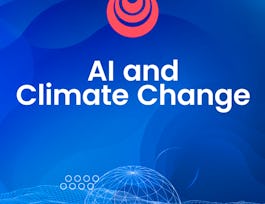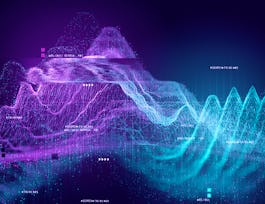In this course, learners will become familiar with the scientific evidence that demonstrates human-caused climate change. We will explore how greenhouse gases cause the Earth to warm, and why our recent warming is attributed to human activities. We will also discuss where our climate is headed, including anticipated future temperature, precipitation, and sea level. Learners will engage with the consequences of these changes on our ecosystems, infrastructure, and communities. We will also identify how political beliefs influence our attitudes about climate change, and apply that knowledge to become better climate communicators.


What is Climate Change?
This course is part of Exploring Our Responses to Climate Change Specialization
Taught in English
Some content may not be translated

Instructor: Joseph Casola
8,134 already enrolled
Included with 
Course
(97 reviews)
What you'll learn
Identify the major components of the climate system
Explain the role of anthropogenic greenhouse gas emissions as the drivers of global climate change
Identify the primary physical and ecological impacts of climate change
Explain the unique process by which scientific information is produced
Details to know

Add to your LinkedIn profile
3 quizzes
Course
(97 reviews)
See how employees at top companies are mastering in-demand skills

Build your subject-matter expertise
- Learn new concepts from industry experts
- Gain a foundational understanding of a subject or tool
- Develop job-relevant skills with hands-on projects
- Earn a shareable career certificate


Earn a career certificate
Add this credential to your LinkedIn profile, resume, or CV
Share it on social media and in your performance review

There are 3 modules in this course
Climate change is real. Scientists agree that human activities are causing the climate to change. Warming will continue in the 21st century, and the amount of warming will be determined by our emissions of greenhouse gases.
What's included
5 videos2 readings1 quiz
The net impact of climate change on ecosystems, infrastructure, and communities is expected to be negative. Many impacts are already occurring, and we expect future warming to exacerbate their effects.
What's included
6 videos1 reading1 quiz
To stay informed about climate change, it is important to know where to get credible information. It’s also important to understand how scientific information is unique from other types of knowledge. Also, it can be helpful to recognize that others’ opinions on climate are heavily influenced by political affiliation. When engaging with others on climate, information needs to be tailored to take into account your audiences concerns and world views.
What's included
6 videos2 readings1 quiz1 peer review
Instructor

Offered by
Recommended if you're interested in Environmental Science and Sustainability

University of Copenhagen

DeepLearning.AI

Duke University

University of Colorado Boulder
Why people choose Coursera for their career




Learner reviews
Showing 3 of 97
97 reviews
- 5 stars
87.62%
- 4 stars
10.30%
- 3 stars
1.03%
- 2 stars
1.03%
- 1 star
0%

Open new doors with Coursera Plus
Unlimited access to 7,000+ world-class courses, hands-on projects, and job-ready certificate programs - all included in your subscription
Advance your career with an online degree
Earn a degree from world-class universities - 100% online
Join over 3,400 global companies that choose Coursera for Business
Upskill your employees to excel in the digital economy
Frequently asked questions
Access to lectures and assignments depends on your type of enrollment. If you take a course in audit mode, you will be able to see most course materials for free. To access graded assignments and to earn a Certificate, you will need to purchase the Certificate experience, during or after your audit. If you don't see the audit option:
The course may not offer an audit option. You can try a Free Trial instead, or apply for Financial Aid.
The course may offer 'Full Course, No Certificate' instead. This option lets you see all course materials, submit required assessments, and get a final grade. This also means that you will not be able to purchase a Certificate experience.
When you enroll in the course, you get access to all of the courses in the Specialization, and you earn a certificate when you complete the work. Your electronic Certificate will be added to your Accomplishments page - from there, you can print your Certificate or add it to your LinkedIn profile. If you only want to read and view the course content, you can audit the course for free.
If you subscribed, you get a 7-day free trial during which you can cancel at no penalty. After that, we don’t give refunds, but you can cancel your subscription at any time. See our full refund policy.

